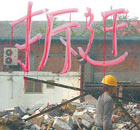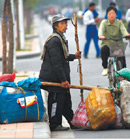Economy and Business
Sichuan to forge 'Golden Triangle' for liquor
By Zhang Ao (chinadaily.com.cn)
Updated: 2010-01-23 15:31
 |
Large Medium Small |
Six leading liquor manufacturers in Sichuan, a main liquor producing province, set up a golden-triangle area Tuesday in Luzhou.
The six, known as the "six golden flowers", will promote Sichuan liquor by forming an integrated brand. Luzhou, known as the City of Liquor, boasts two household liquor manufacturers, Luzhou Liquor and Lang Liquor.
| ||||
With an increasing number of immigrating liquor manufacturers, a 12 billion yuan ($1.76b) industrial zone for concentrated development is also under construction in Luzhou, aiming to provide manufacturers with cheaper facilities and better services.
The government is also planning to borrow experience from the first-class liquor Maotai, a Guizhou company, which lies on the other side of Chishui River.
Located in the hilly Southeast Sichuan, this triangle area is somewhat lacking in transportation. "However, we will never move our liquor fermenting factories to somewhere else. If we do, they will not be what they are", said Zhu Yizhuang, party secretary of Luzhou.
Export strategies for Sichuan liquor have been under discussion for a long time.
The export value of Chinese liquor reached 1.7 billion yuan ($250m) in 2008. Consumers were mostly overseas Chinese.
"Chinese liquor is not so popular among foreigners, due to the inadequate understanding of Chinese cuisine and culture, as well as a strict prohibition on the alcohol level," said Xie Ming, CEO of Luzhou Liquor, who urged a stimulus policy from the government and a more open foreign market.
"Only when Chinese culture is accepted by more, will people abroad love our liquor. I believe in the bright future of Sichuan Liquor. However, the road ahead is lengthy and arduous," Xie added.










